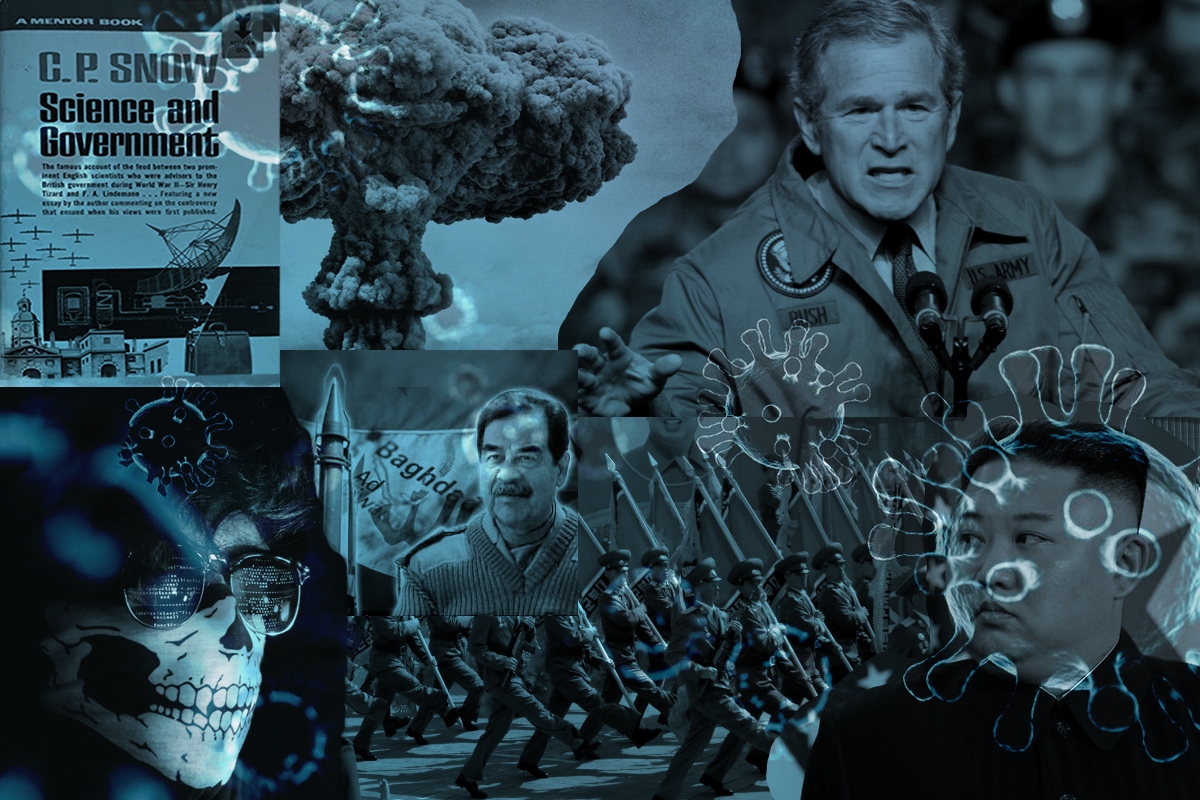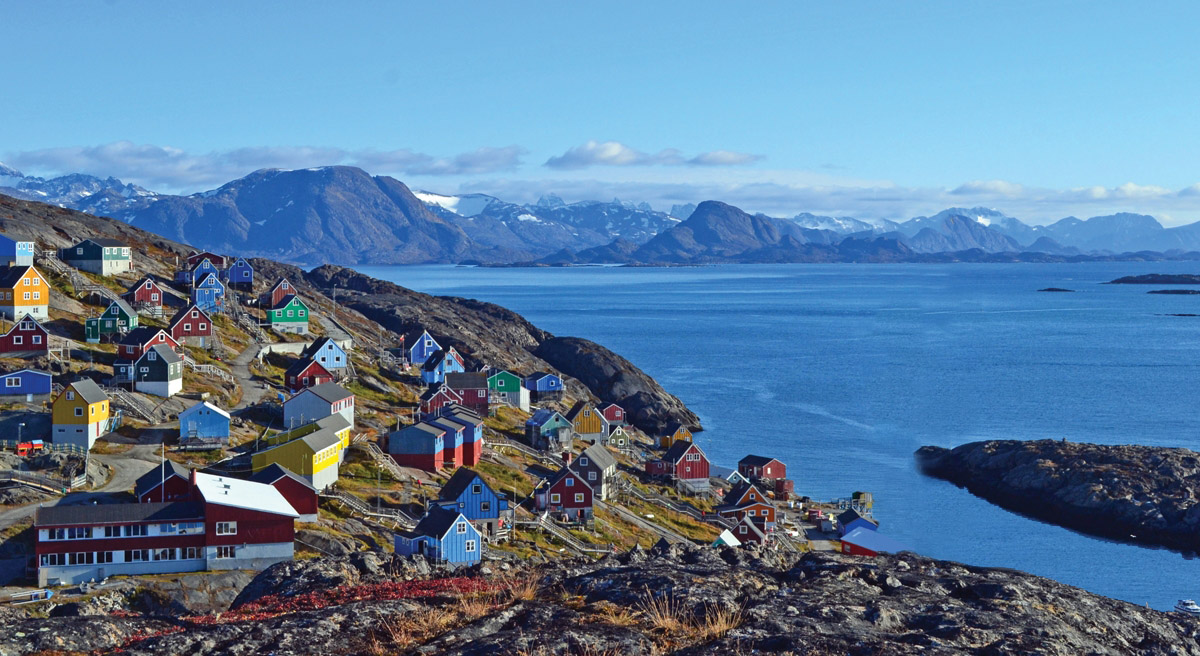
Science and politics: always a stormy marriage
The global Covid-19 pandemic seems an all-consuming issue these days, but it is by no means the first of a burgeoning new class of public policy issues. In trying to make sense out of the important issues public policy issues today, one must accommodate two important new facts of life.
The first is that, compared to past eras, more of the key issues of public policy don't stay confined regionally. Of course the current Covid-19 pandemic has underscored that in the most dramatic way, but it’s not the only issue that breaks the conventional bounds of geography. Globalization in trade and finance has tied together the economic realities across the entire developed world as never before. Some of the physical threats are also not easily confined geographically or attributed to specific nation states either, from militant jihad, sometimes expressed as terrorism, to the ripple effects from failed and failing states, as exemplified by the piracy concerns extending from East Africa across the Indian Ocean. And regardless of one's take on climate change and the scale of anthropogenic contributions to its rate, it also has no borders, and neither do all the attendant energy issues.
The second new fact of life is that to a greater extent than ever before, political decisions on large-scale issues also rest on an underpinning of complicated and uncertain science, whether that science is biology, medicine, climate science, nuclear engineering, aeronautics, or information technology. But science and politics are uncomfortable travelling companions, and always have been.
Distortions of science by the political process are inevitable, even in the most open and democratic systems, because they are inherently different processes and reach conclusions or decisions by entirely different methodologies. Ideally, in science, there is a process of continuous refinement, building on past established data and facts, with experimentation, confirmation, open verification and civil discourse.
In politics, with all the best will in the world, the competition for media attention and popular support produces tactical exaggeration, incomplete discourse, huge oversimplification, transient effects, short memory, intense partisanship, and convergence only when absolutely necessary, and not always even then. Overlaid on all that are the complications of secrecy, sometimes needed, especially where issues of national defence, security or even general well-being of the state are concerned, and sometimes merely desired by government to avert complexity and embarrassment in the political arena. So it is unsurprising that plenty of lawyers and relatively few scientists end up in parliament, and that the political sphere may unintentionally abuse science for political purposes.
There is another reason why there are so few scientists in the elected legislative bodies of the liberal democracies. That is because, in real democracies, elected office is a contract job which may well last decades, but may also be as short as a few years. Folks coming to politics from the encyclopaedic disciplines like law, political science, or the humanities can return to their former occupations after they leave public office. They might require a modest updating to be fully aware of the latest work in their fields, but can still be effective in returning to their prior lives. Often the activities and issues of their political lives have actually kept them well informed of evolving trends in their former occupations. But those coming from leading edge research in the experimental disciplines can rarely go back. Once they leave the research granting stream, and their original field passes them by, they can almost never catch up again. So few take the risk to go into the contract-work of elected office.
Back in the late 1970’s and early 1980’s, I led the attempt by a consortium of learned societies to educate Canadian parliamentarians on the need for investment in fundamental research, and in doing that task, I sent two-person interviewing teams of experts once or twice a year to meet with every MP who would consent to such discussions, which usually meant about 70 per cent of the members of the House of Commons. Because the interviewing teams met privately with each MP, discussions were relatively open, and the team members got good insights into how knowledgeable each MP was about scientific issues.
The reports from our interviewing teams included a scoring system for their estimates of how knowledgeable the MP’s were. We used a 1-5 scale, with “5” meaning “as knowledgeable as our experts” and “1” meaning “has virtually no comprehension of science or scientific issues”. Then we aggregated the data from five years of this process, grouping MP’s by their prior occupation. We could then see that on scientific issues, the two best informed and most knowledgeable groups of MP’s were (a) the small group of MP’s who were physicians, and (b) the MP’s who had been farmers. By the numbers, the few physicians had an average score of about 4.5, the few farmers about 4, the large group of lawyers about 2.7, and the self-made business folk about 1.6. Hence it is probably unavoidable that the Canadian polity would show some lack of prescience, some opportunism and some political missteps on science-based issues.
And that's the best of it. Worse yet, history is replete with examples of repressive regimes making bad science serve ideological purposes. Within the past century, Nazi science appalled humanity, while Stalin harnessed the fraudulent work of Trofim Lysenko to create a noxious fable running counter to modern genetics. Nor is this new. The Church's concerns about Galileo and about Copernicus, and two millennia of deference to Aristotle's reasoning at the expense of experimentation, or the stagnation of medicine because of slavish reliance upon Galen, only finally countered in part by William Harvey, are earlier examples of ideology trumping science.
Sometimes the public is fed bad science for a good reason, as during the Second World War, when the biochemically plausible but untrue link between consuming carrots and improving night vision was widely circulated by UK authorities as a security ruse to explain away the success of British night fighters, by then secretly equipped with airborne miniaturized radar, against German bombers. How many of us were brought up being told, “Eat your carrots, it's good for your vision”?
And even “good” governments can have their favourite scientists and their preferred science. In the Godkin Lectures at Harvard in 1960, physicist and writer C. P. Snow detailed the wartime feud in Britain between key science advisors Sir Henry Tizard and Frederick Lindemann (Lord Cherwell). Published as “Science and Government” a year later, his discourse is persuasive about how badly even democratic governments inevitably handle scientific knowledge and opinion on questions of key national interest, especially when secrecy is required. And 60 years on, the U.S. intelligence failures over weapons of mass destruction in Iraq underscored how, in a necessarily secret environment, evidence and opinion link arms so tightly that they are hard to disentangle.
Clearly a good part of the uneasy fit between science and government hinges upon the occasional need for, and the rather more frequent desire for, secrecy by government. China's delays and lack of candour over SARS in 2003, and more recently over Covid-19, and similar temporizing and understating during nuclear accidents by the Soviet Union at the time of Chernobyl, and to a lesser but non-zero extent by Japan over Fukushima Daiichi were doubtless intended in the first instance by those governments to protect them from embarrassment and perhaps to be ameliorative by preventing panic, but objectively did harm by delaying the appropriate full-scale responses.
But inability of most governments to cope with science is not only about delay and under-reaction; political overreactions, while less frequent, do occur as well, especially with anything which sounds scary, whether it is or not. For example, in the nuclear energy field, a venting of a trivial amount of a relatively short lived and weak beta-emitter like tritium is often spun and then reacted to as if it were a near-meltdown.
Canada has no immunity from the science and government conundrum. In the early 1960's the Liberal decision to accept four separate American nuclear weapons systems for use by the RCAF and the Canadian Army under dual key arrangements with the US was justified by quite out-of-date science and strategic thinking that largely had just gone out of fashion in the US at the moment we came on board, but the decision suited us politically for a brief period.
More recently, we had a notable failure in Canada in 2003, when extremely ineffectual, even minimalist, steps at both the federal and Ontario levels during the SARS outbreak underscored the collision between science and politics. I have set out the view elsewhere that Ontario handled that matter more awkwardly and less effectively that any other jurisdiction in the developed world. In some ways, that bad experience with a fairly hard to transmit virus did however condition our governments to do a vastly better, but far from perfect job dealing with Covid-19.
Today, other than the centrepiece of the struggle against the Covid-19 pandemic, Canada faces a broad range of near-term questions that are underpinned by the sort of scientific complexities that tend to befuddle governments. Some examples are:
1. How do we counter cyber threats? What legal changes are needed for active cyber defence, as opposed to merely passive measures? What research is critical to keep ahead of those threats?
2. What additional weapons of mass destruction (WMD) proliferation risks are posed by various actors on the world stage? How close is Iran to a nuclear weapon? Is Iranian rhetoric about wiping out Israel to be believed, or, perhaps more cogently, can one justify discounting it, since all other Iranian rhetoric seems to have been acted upon to a degree? Will Iranian devices find their way into the hands of non-state extreme Islamist groups in the same way other Iranian weapons do, and over what time scale? And what about possible transfer to other actors of devices made by Pakistan or North Korea? What are current risks from dirty bombs, chemical and biological weapons, and how are these technologies evolving?
3. To what extent have the early extreme opposing views on rates of climate change converged on a middle ground? What are the best estimators of time scales for dealing with sovereignty issues in a more open arctic? To what extent and how quickly will climate change issues produce human migrations more extensive than those being seen now, and how will our policies, and our defence and security postures be affected by these instabilities?
4. What other pandemics are on the horizon? What preparations, both scientifically and in the policy and legal domain, do we need to be reasonably prepared for pandemic risks in general?
5. Can we predict the economic patterns to come? How much budget manipulation is needed, and for how long? In terms of risks, is the dismal science able to keep up with the inventive minds of those who package investments in weird forms?
6. Do we have a correct threat taxonomy? Are there substantial threats we have not foreseen? Are we making the usual mistake of extrapolating from only the most recent past, and assuming threats will be similar? On the other hand, have we rigorously extracted all the good lessons we can from the recent past?
Many of these questions will need years of additional study to be answered adequately, and possibly years after that to fully penetrate the political consciousness of the nation. Sometimes that work falls upon those who do not expect it. For example, the process of reforming or simplifying defence procurement or any other technology procurement, and indeed, the entire operation of procurement abuts against these science-based problems every day, with all of the attendant uncertainties inherent therein. It was always thus, when setting out to buy a thing which does not yet exist, but technological intensification now just makes it harder.
Elected governments and legislative assemblies are not especially good at addressing issues that have a time base longer than a couple of electoral cycles, not do they do well with world-girdling issues with a science component. They need to get better at these things, and, in some ways, Covid-19 may have shed a glimmer of light on how that might happen. An encouraging feature of the struggle against Covid-19 is the new emphasis upon and respect for actual expertise. In Canada, the highly visible, credible roles played by provincial and local directors of public health have been notable. And while the news media still dumb down science stories more than they need to, there are many more knowledgeable voices on the public stage than in the past. In the United States, the President backed away from a campaign he had begun against Dr. Anthony Fauci because, if forced to choose, most Americans found the scientist more believable than the politician. A crisis can sometimes diminish the importance of issues of style and appearance and boost the importance of tested, confirmed fact. So when we come out of the other side of the current crisis, probably some time in 2021, maybe the marriage of science and government will be just a little less stormy than before.
Photo compilation includes masked man by Nahel Abdul Hadi, Unsplash









